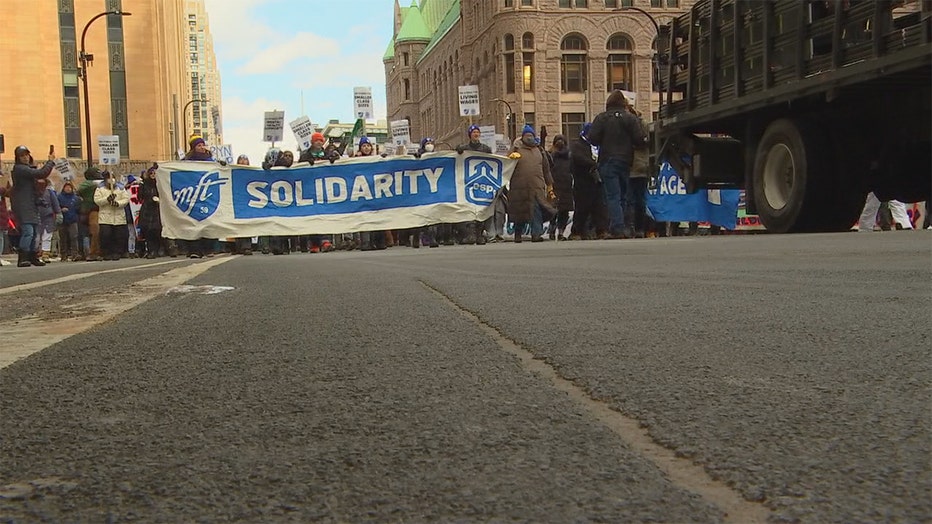Minneapolis teachers strike puts spotlight on school funding needs

School funding questions persist as teacher’s strike continues
As striking teachers and their supporters marched through downtown Minneapolis, on their third day of a strike, their fight for a better contract has brought up larger conversations about school funding.
MINNEAPOLIS (FOX 9) - As striking teachers and their supporters marched through downtown Minneapolis on their third day of a strike, their fight for a better contract has brought up larger conversations about school funding.
Several hundred people, all wearing blue, took the streets around the Hennepin County Government Center – car horns honking in support. The teachers seek better pay, especially for educational assistants, as well as smaller class sizes and better support for mental health.
Across the river, in front of the Governor’s Mansion in St. Paul, a smaller group rallied with signs, too. The National Parents Union gathered to ask that the state’s $9 billion budget surplus be used to tackle larger educational issues, particularly when it comes to the state’s large achievement gap.
"Black and brown families have been facing an education deficit disparity impact since prior to COVID," Khulia Pringle of the National Parents Union (NPU) told FOX 9. "We want public education to be fully funded, so we’re not in this situation every two years."
Minnesota has one of the largest achievement gaps in the nation. The NPU argues that the same attention given to the strike in Minneapolis should be given to solving these problems through urgent increases in state funding.

As striking teachers and their supporters marched through downtown Minneapolis, on their third day of a strike, their fight for a better contract has brought up larger conversations about school funding.
"Kids who can’t read have behavior problems that those kids get labeled emotionally disordered, they get suspended, they don’t have teachers that look like them, they don’t have a curriculum that talks about them," said Khulia. "So there’s issues that we feel as black and brown families, we feel that those issues need to be elevated."
But for years supporters of early education funding have argued the best way to tackle the achievement gap is to prevent it from happening. They also push for more state funding, but believe it’s best spent on young children.
"I know the public schools tend to get blamed for the achievement gap, but it starts well before kindergarten," said Art Rolnick, formerly of the Federal Reserve and currently a fellow at the Humphrey School. "When kids start school unprepared, when they’re not ready for school, on average they don’t catch up."
Rolnick says early childhood educational advocates support more funding for public schools, but will continue to push to significantly invest in pre-K programs to help poorer families, who are predominantly families of color.
They also hope the strike in Minneapolis helps put the spotlight on funding as a whole, and there will be more pressure on legislators to put more money to the very young.
"If you wait until kindergarten and just put more money into the public school systems, we’ll be talking about this same issue ten years from now," said Rolnick.

